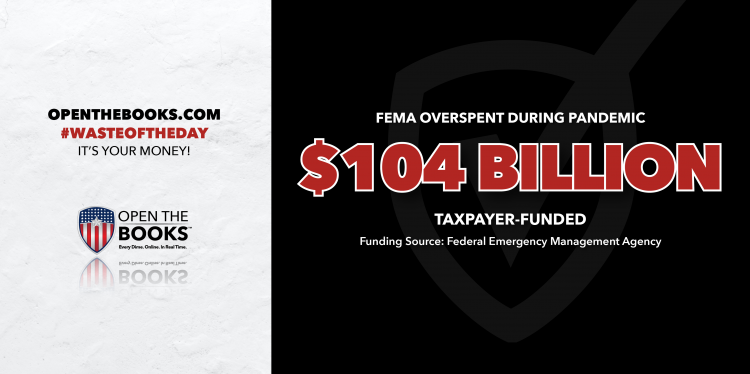Executive
Waste of the Day: Disaster Relief Fund in Danger After $104 Billion COVID Spending
The Disaster Relief Fund might run dry next time, after the government spent $104 billion on COVID relief, some of it unnecessary.

Topline: The Federal Emergency Management Agency greatly underestimated how much money it needed to spend on the COVID-19 pandemic and now might not have enough funds to address future disasters, according to the Government Accountability Office.
Too big a COVID-19 budget
Key facts: FEMA predicted in early 2020 that it would spend $17.6 billion on pandemic programs, but officials say that estimate was “blown out of the water” by the actual price tag. FEMA has already spent $103.6 billion on pandemic aid and expects the total to reach $171.6 billion by August 2026. But lawmakers have only provided $97 billion in supplemental funding because Congressional budgets were written based on FEMA’s incorrect estimates. The goal is for estimates to be within 10% of FEMA’s actual spending, but that hasn’t happened since 2021.

That’s already posed issues for FEMA. Its Disaster Relief Fund had such a low balance in August 2023 that officials had to pause all spending that was not “essential for lifesaving or life-sustaining activities” for two months, leading to delays in funding for local governments, according to the GAO.
Yet FEMA continues to approve new expenses related to COVID-19, even though the public health emergency ended on May 11, 2023. Officials are still reviewing grant applications submitted before a November 2023 deadline and allowed 67 other projects to submit applications after the deadline.
Search all federal, state and local government salaries and vendor spending with the AI search bot, Benjamin, at OpenTheBooks.com.
Purpose of the Disaster Relief Fund
Background: The Disaster Relief Fund is normally used to support state and local governments and individual families after hurricanes, earthquakes or other catastrophes.
The pandemic was the first time it was used for a public health emergency, and it ended up being the most expensive event in at least 32 years, according to the Congressional Budget Office. Between 1992 and 2021, 20% of all disaster funding went toward COVID-19 programs.
FEMA sent money to state governments to provide medical care and distribute protective equipment like masks. The agency also reimbursed families up to $9,000 for funeral expenses, $300 to $400 per week for lost wages, and paid for “crisis counseling” to combat the “psychological effects” of the pandemic.
Critical quote: FEMA officials disagreed with the GAO’s recommendation that they review their mistakes to prepare for future emergencies. The agency “does not plan to assess or change the overall estimation process for declared catastrophic disasters based on its experience with COVID-19” because “they do not expect another pandemic to occur.”
Summary: Pretty soon, the biggest “disaster” facing FEMA may be its inability to manage its budget properly.
The #WasteOfTheDay is brought to you by CEO & founder, Adam Andrzejewski, with Jeremy Portnoy. Learn more at OpenTheBooks.com.
This article was originally published by RealClearInvestigations and made available via RealClearWire.
Adam Andrzejewski (say: Angie-eff-ski) was the CEO/founder of OpenTheBooks.com. Before dedicating his life to public service, Adam co-founded HomePages Directories, a $20 million publishing company (1997-2007). His works have been featured on the BBC, Good Morning America, ABC World News Tonight, C-SPAN, The Wall Street Journal, The New York Times, USA Today, FOX News, CNN, National Public Radio (NPR), Forbes, Newsweek, and many other national media.
Today, OpenTheBooks.com is the largest private repository of U.S. public-sector spending. Mission: post "every dime, online, in real time." In 2022, OpenTheBooks.com captured nearly all public expenditures in the country, including nearly all disclosed federal government spending; 50 of 50 state checkbooks; and 25 million public employee salary and pension records from 50,000 public bodies across America.
The group's aggressive transparency and forensic auditing of government spending has led to the assembly of grand juries, indictments, and successful prosecutions; congressional briefings, hearings, and subpoenas; Government Accountability Office (GAO) audits; Congressional Research Service (CRS) reports; federal legislation; and much more.
Our Honorary Chairman - In Memoriam is U.S. Senator Tom Coburn, MD.
Andrzejewski's federal oversight work was included in the President's Budget To Congress FY2021. The budget cited his organization by name, bullet-pointed their findings, and footnoted/hyperlinked to their report.
Posted on YouTube, Andrzejewski's presentation, The Depth of the Swamp, at the Hillsdale College National Leadership Seminar 2020 in Naples, Florida received 3.8 million views.
Andrzejewski has spoken at the Columbia School of Journalism, Harvard Law School and the law schools at Georgetown and George Washington regarding big data journalism. As a senior policy contributor at Forbes, Adam had nearly 20 million pageviews on 206 published investigations. In 2022, investigative fact-finding on Dr. Fauci's finances led to his cancellation at Forbes.
In 2022, Andrzejewski did 473 live television and radio interviews across broadcast, major cable platforms, and radio shows. Andrzejewski is the author of The Waste of the Day column at Real Clear Policy. The column is syndicated by Sinclair Broadcast Group, owners of nearly 200 ABC, NBC, CBS, and FOX affiliates across USA.
Andrzejewski passed away in his sleep at his home in in Hinsdale, Illinois, on August 18, 2024. He is survived by his wife Kerry and three daughters. He also served as a lector at St. Isaac Jogues Catholic Church and finished the Chicago Marathon eight times (PR 3:58.49 in 2022).
Waste of the Day articles published after August 18, 2024 are considered posthumous publications.
-

 Accountability4 days ago
Accountability4 days agoWaste of the Day: Principal Bought Lobster with School Funds
-

 Civilization1 day ago
Civilization1 day agoWhy Europe Shouldn’t Be Upset at Trump’s Venezuelan Actions
-

 Executive2 days ago
Executive2 days agoHow Relaxed COVID-Era Rules Fueled Minnesota’s Biggest Scam
-

 Constitution3 days ago
Constitution3 days agoTrump, Canada, and the Constitutional Problem Beneath the Bridge
-

 Christianity Today1 day ago
Christianity Today1 day agoSurprising Revival: Gen Z Men & Highly Educated Lead Return to Religion
-

 Civilization2 days ago
Civilization2 days agoThe End of Purple States and Competitive Districts
-

 Executive2 days ago
Executive2 days agoWaste of the Day: Can You Hear Me Now?
-

 Civilization5 days ago
Civilization5 days agoThe Conundrum of President Donald J. Trump






